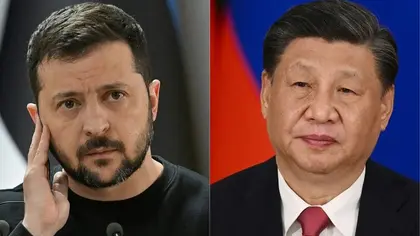President Zelensky spoke by phone on Wednesday with Chinese President Xi Jinping, a call with huge political significance that instantly riled Moscow.
Here are 5 things you need to know…
JOIN US ON TELEGRAM
Follow our coverage of the war on the @Kyivpost_official.
China is pushing hard for negotiations
Chinese state broadcaster CCTV reported that during the call Xi told Zelensky that "talks and negotiation" were the "only way out" of the war.
"On the issue of the Ukraine crisis, China has always stood on the side of peace and its core position is to promote peace talks," CCTV reported Xi as saying.
- Get the most recent war in ukraine update from the Kyiv Post's daily news reports for today.
- Obtain the most current Ukraine news articles released today.
According to a readout of the call, Xi said China "will neither watch the fire from the other side, nor add fuel to the fire, let alone take advantage of the crisis to profit".
"When dealing with the nuclear issue, all parties concerned should remain calm and restrained, truly focus on the future and destiny of themselves and all mankind, and jointly manage and control the crisis," Xi said.
China also said it would send a delegation and a "special representative" of its government to Ukraine with the aim of finding a "political settlement" to the conflict.
Ukraine has said it would not negotiate with Russian President Vladimir Putin and that peace would only be possible after Russia withdrew its troops so watch this space.
It was a long call
Zelensky's spokesman Sergiy Nykyforov said on Facebook that the two leaders had "an almost one-hour-long telephone conversation".
"I had a long and meaningful phone call with President Xi Jinping," Zelensky said on Twitter.

‘Putin Should Make a Deal’ – Trump Discusses NATO and Ending Ukraine War, Russia’s Losses
"I believe that this call… will give a powerful impetus to the development of our bilateral relations," he wrote.
It’s already producing hard results
Zelensky appointed a new ambassador to Beijing on Wednesday after the call.
Pavel Ryabikin, who previously headed the ministry of strategic industries of Ukraine, was named Kyiv's new envoy to China, according to a decree on the presidency's website.
Ryabikin headed the State Customs Service of Ukraine from 2020 to 2021 and was a deputy of the Verkhovna Rada of Ukraine of the 7th convocation, a member of the Parliamentary Assembly of the Council of Europe since 2012.
Ukraine has not had an ambassador in Beijing since the death of Serhiy Kamyshev on February 14, 2021.
Moscow didn’t like it
Moscow on Wednesday accused Kyiv of undermining any peace attempts in its reaction to the call. "The Ukrainian authorities and their Western minders have already shown their ability to mess up any peace initiatives," the Russian foreign ministry said.
Moscow noted "the readiness of the Chinese side to make efforts to establish a negotiation process” but accused Kyiv of having rejected "any sensible initiatives aimed at a political and diplomatic settlement."
"The eventual consent to negotiations is conditioned by ultimatums with obviously unrealistic demands," it said.
There’s a long backstory to the call…
The call is the first time the two men have spoken since the start of the full-scale Russian invasion last year.
Zelensky has said repeatedly he would be open to talks with his Chinese counterpart, and Wednesday's telephone call "was initiated by the Ukrainian side", Yu Jun from China's foreign ministry told a press conference.
February's 12-point paper called for a "political settlement" to the crisis and portrayed China as a neutral party, urging the two sides to enter into peace negotiations.
Its first point was that "the sovereignty, independence and territorial integrity of all countries must be effectively upheld", AFP reports.
But China has consistently refused to expand upon how that relates to the specifics of the Ukraine war, which was triggered when Moscow's forces invaded their neighbour.
In the paper, Beijing called on Russia and Ukraine to resume peace talks, stating that "dialogue and negotiation are the only viable solution".
"The international community should stay committed to the right approach of promoting talks for peace, help parties to the conflict open the door to a political settlement as soon as possible, and create conditions and platforms for the resumption of negotiation," the paper read.
The document was met with scepticism from Ukraine's allies, with NATO chief Jens Stoltenberg saying Beijing "doesn't have much credibility because they have not been able to condemn the illegal invasion of Ukraine".
Many at the time pointed to the fact that Xi had met with Putin but not even called Zelensky as evidence that China was not the impartial observer it claimed to be. The Chinese leader's Moscow visit -- during which Xi said ties with Russia were entering "a new era" -- was viewed as a coup for Putin.
"I am sure that Russian-Chinese cooperation has truly unlimited possibilities and prospects," Putin said following the talks, where he toasted the "prosperity" of Russian and Chinese people and highlighted the "special nature" of the relationship between the two countries.
Putin called the talks with Xi "meaningful and frank" and said that Russia, which has been largely cut out of European markets because of sanctions, would be able to meet China's "growing demand" for energy.
You can also highlight the text and press Ctrl + Enter










